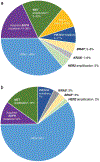Optimizing the sequencing of tyrosine kinase inhibitors (TKIs) in epidermal growth factor receptor (EGFR) mutation-positive non-small cell lung cancer (NSCLC)
- PMID: 31568888
- PMCID: PMC7478849
- DOI: 10.1016/j.lungcan.2019.09.017
Optimizing the sequencing of tyrosine kinase inhibitors (TKIs) in epidermal growth factor receptor (EGFR) mutation-positive non-small cell lung cancer (NSCLC)
Abstract
Non-small cell lung cancer (NSCLC) is the most common type of lung cancer, accounting for 80-85% of cases. Epidermal growth factor receptor (EGFR) mutations are observed in approximately 40% and 20% of patients with NSCLC in Asian and non-Asian populations, respectively. First-generation (gefitinib, erlotinib) and second-generation (afatinib, dacomitinib) EGFR-tyrosine kinase inhibitors (TKIs) have been standard-of-care (SoC) first-line treatment for patients with sensitizing EGFR mutation positive advanced NSCLC following Phase III trials versus platinum-based doublet chemotherapy. However, most patients treated with first-line first- or second-generation EGFR-TKIs develop resistance. Osimertinib, a third-generation, central nervous system active EGFR-TKI which potently and selectively inhibits both EGFR-TKI sensitizing (EGFRm) and the most common EGFR T790 M resistance mutations, has shown superior efficacy versus first-generation EGFR-TKIs (gefitinib / erlotinib). Osimertinib is now a treatment option for patients with advanced NSCLC harboring EGFRm in the first-line setting, and treatment of choice for patients with T790 M positive NSCLC following disease progression on first-line EGFR-TKIs. The second-generation EGFR-TKI dacomitinib has also recently been approved for the first-line treatment of EGFRm positive metastatic NSCLC. There remains a need to determine appropriate sequencing of EGFR-TKIs in this setting, including EGFR-TKIs as monotherapy or in combination with other TKIs / signaling pathway inhibitors. This review considers the evolving role of sequencing treatments to maximize benefits for patients with EGFRm positive advanced NSCLC.
Keywords: Epidermal growth factor receptor; Exon 19 deletion; Exon 21 mutation; Non-small cell lung cancer; Sequencing; Tyrosine kinase inhibitor.
Copyright © 2019 The Authors. Published by Elsevier B.V. All rights reserved.
Figures



Similar articles
-
Dacomitinib in lung cancer: a "lost generation" EGFR tyrosine-kinase inhibitor from a bygone era?Drug Des Devel Ther. 2015 Oct 15;9:5641-53. doi: 10.2147/DDDT.S52787. eCollection 2015. Drug Des Devel Ther. 2015. PMID: 26508839 Free PMC article. Review.
-
Can we define the optimal sequence of epidermal growth factor receptor tyrosine kinase inhibitors for the treatment of epidermal growth factor receptor-mutant nonsmall cell lung cancer?Curr Opin Oncol. 2017 Mar;29(2):89-96. doi: 10.1097/CCO.0000000000000350. Curr Opin Oncol. 2017. PMID: 28085680 Review.
-
Ideal sequencing in Stage IV epidermal growth factor receptor mutant Non-Small-Cell Lung Cancer.Indian J Cancer. 2022 Mar;59(Supplement):S80-S89. doi: 10.4103/ijc.IJC_50_21. Indian J Cancer. 2022. PMID: 35343193 Review.
-
Afatinib as First-Line Treatment in Asian Patients with EGFR Mutation-Positive NSCLC: A Narrative Review of Real-World Evidence.Adv Ther. 2021 May;38(5):2038-2053. doi: 10.1007/s12325-021-01696-9. Epub 2021 Mar 17. Adv Ther. 2021. PMID: 33730350 Free PMC article. Review.
-
Observational Study of Treatment Patterns in Patients with Epidermal Growth Factor Receptor (EGFR) Mutation-Positive Non-Small Cell Lung Cancer After First-Line EGFR-Tyrosine Kinase Inhibitors.Adv Ther. 2020 Feb;37(2):946-954. doi: 10.1007/s12325-020-01221-4. Epub 2020 Jan 18. Adv Ther. 2020. PMID: 31955357
Cited by
-
Safety and efficacy of combining afatinib and whole-brain radiation therapy in treating brain metastases from EGFR-mutated NSCLC: a case report and literature review.BJR Case Rep. 2022 Sep 12;8(5):20200134. doi: 10.1259/bjrcr.20200134. eCollection 2022 Sep 12. BJR Case Rep. 2022. PMID: 36211614 Free PMC article.
-
Targeted therapy based on ubiquitin-specific proteases, signalling pathways and E3 ligases in non-small-cell lung cancer.Front Oncol. 2023 Mar 9;13:1120828. doi: 10.3389/fonc.2023.1120828. eCollection 2023. Front Oncol. 2023. PMID: 36969062 Free PMC article. Review.
-
[Research Progress of Angiogenesis Inhibitors Plus EGFR-TKI in EGFR-mutated Advanced Non-small Cell Lung Cancer].Zhongguo Fei Ai Za Zhi. 2022 Aug 20;25(8):583-592. doi: 10.3779/j.issn.1009-3419.2022.101.41. Zhongguo Fei Ai Za Zhi. 2022. PMID: 36002195 Free PMC article. Review. Chinese.
-
Long non-coding RNA SNHG17 promotes lung adenocarcinoma progression by targeting the microRNA-193a-5p/NETO2 axis.Oncol Lett. 2021 Dec;22(6):818. doi: 10.3892/ol.2021.13079. Epub 2021 Oct 5. Oncol Lett. 2021. PMID: 34671432 Free PMC article.
-
Mitochondria-related lncRNAs: predicting prognosis, tumor microenvironment and treatment response in lung adenocarcinoma.Funct Integr Genomics. 2023 Oct 21;23(4):323. doi: 10.1007/s10142-023-01245-3. Funct Integr Genomics. 2023. PMID: 37864709 Free PMC article.
References
-
- World Health Organization. Cancer - Key facts, 2018. Available at http://www.who.int/news-room/fact-sheets/detail/cancer accessed on 20 February.
-
- Planchard D, Popat S, Kerr K, Novello S, Smit EF, Faivre-Finn C, et al. Metastatic non-small cell lung cancer: ESMO Clinical Practice Guidelines for diagnosis, treatment and follow-up. Ann Oncol 2018;29:iv192–iv237. - PubMed
-
- Kalemkerian GP, Narula N, Kennedy EB, Biermann WA, Donington J, Leighl NB, et al. Molecular Testing Guideline for the Selection of Patients With Lung Cancer for Treatment With Targeted Tyrosine Kinase Inhibitors: American Society of Clinical Oncology Endorsement of the College of American Pathologists/International Association for the Study of Lung Cancer/Association for Molecular Pathology Clinical Practice Guideline Update. J Clin Oncol 2018;36:911–9. - PubMed
Publication types
MeSH terms
Substances
Grants and funding
LinkOut - more resources
Full Text Sources
Medical
Research Materials
Miscellaneous

